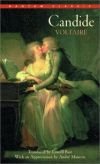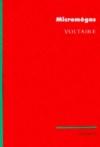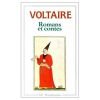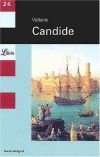
Candide er en roman fra 1759 av den franske forfatteren Voltaire. Romanen er et satirisk svar på den samtidige filosofen Leibniz' tese at menneskene lever «i den beste av alle mulige verdener». Leibniz ideer blir representert av huslæreren Doktor Pangloss, som underviser en ung mann, hovedpersonen Candide, på et gods …
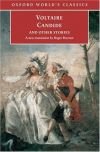
Candide er en roman fra 1759 av den franske forfatteren Voltaire. Romanen er et satirisk svar på den samtidige filosofen Leibniz' tese at menneskene lever «i den beste av alle mulige verdener». Leibniz ideer blir representert av huslæreren Doktor Pangloss, som underviser en ung mann, hovedpersonen Candide, på et gods …
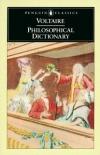
Dictionnaire philosophique – egentlig Dictionnaire philosophique portatif – er et leksikon skrevet av den franske filosofen Voltaire i 1764. Voltaire fant Diderot og d'Alemberts Encyclopédie for omfangsrik, og skrev et leksikon i håndbokformat. Han utelot bidragsyterens navn, og unngikk dermed sensuren. Leksikonet er …

Candide er en roman fra 1759 av den franske forfatteren Voltaire. Romanen er et satirisk svar på den samtidige filosofen Leibniz' tese at menneskene lever «i den beste av alle mulige verdener». Leibniz ideer blir representert av huslæreren Doktor Pangloss, som underviser en ung mann, hovedpersonen Candide, på et gods …

Zadig ou la Destinée is a famous novel and work of philosophical fiction written by Enlightenment philosopher Voltaire. It tells the story of Zadig, a philosopher in ancient Babylonia. The author does not attempt any historical accuracy, and some of the problems Zadig faces are thinly disguised references to social …

Lettres philosophiques is a series of essays written by Voltaire based on his experiences living in England between 1726 and 1729. It was published first in English in 1733 and then in French the following year, where it was seen as an attack on the French system of government and was rapidly suppressed. Most modern …
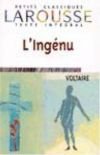
L'Ingénu is a satirical novella by the French writer Voltaire, published in 1767. It tells the story of a Huron called "Child of Nature" who, after having crossed the Atlantic to England, crosses into Brittany, France in the 1690s. Upon arrival, a prior notices depictions of his brother and sister-in-law, whom they …

 English
English Español
Español Deutsch
Deutsch
